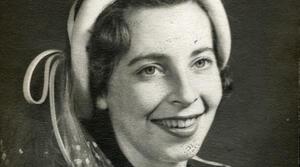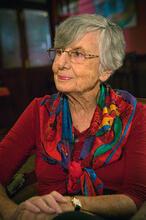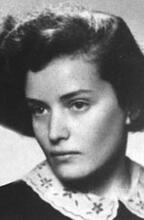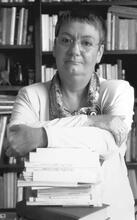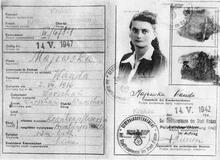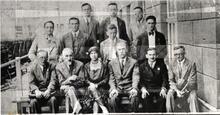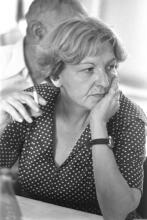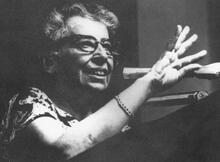Jean Jaffe
Jean Jaffe ca. 1940. Courtesy of the Forward Association
Jean Jaffe began writing for Der Yidishes Tageblat at age sixteen and quickly developed an audience for her work at various liberal Yiddish papers, including Der Amerikaner and Di Fraye Arbeter Shtime. In 1920 she became a staff reporter for Der Tog, where she earned a reputation as one of the leading Yiddish journalists of her time. Jaffe refused to be pigeonholed, writing on subjects ranging from art and theater to politics. She travelled to Poland on the eve of World War II and was one of the first reporters to do stories from displaced persons camps after the war. In the 1950s she followed Yemenite Jews fleeing to Israel and in 1956 covered the Hungarian uprising. Her work was published in various Yiddish papers around the world and she served on the editorial board of Pioneer Woman, a Labor Zionist periodical.
From the 1920s until her death, Jean Jaffe distinguished herself as one of the leading journalists in the Yiddish press. Jaffe roamed the globe as a reporter—the very best in her field according to some colleagues. A lifelong Labor Zionist, Jaffe spent several lengthy periods in Palestine and Israel.
Early Life and Career
Born on April 20, 1900, in a Lithuanian (Yiddish) Small-town Jewish community in Eastern Europe.shtetl (sources differ on the exact place), Jean Jaffe immigrated to New York City with her parents in 1910. Along with six brothers and sisters, Jaffe grew up on Henry Street, in the heart of the Lower East Side. She attended both public school and a Labor Zionist natsyonaler arbeter farband [national workers organization] school, where she mastered Yiddish and Hebrew. She later studied at Hunter College and Columbia University. Jaffe embarked on a literary career writing short stories in Hebrew but soon thereafter took up Yiddish as her primary medium. In 1916, Jaffe began writing for the daily Der Yidishes Tageblat, where she quickly gained popularity as a journalist. She also contributed to several other newspapers, including Der Amerikaner, Di Fraye Arbeter Shtime [The free voice of labor] (an anarchist weekly noted for its high literary standards), and the satirical weekly Der Groyser Kundes [The big stick]. In 1920, Jaffe joined the staff of the liberal daily Der Tog [The day] (after 1928, Der Tog-Morgn Zhurnal), where she remained employed until her death. Throughout her career, Jaffe’s work appeared in Canadian, South American, Israeli, and (until World War II) Polish Yiddish publications. Jaffe also published articles in English-language publications in New York, such as the New York Herald Tribune, and sat on the editorial board of Pioneer Woman, a Labor Zionist monthly to which she regularly contributed.
Journalistic Themes
Jaffe’s work encompassed a range of areas including art, music, theater, political affairs, and human interest stories. Primarily, though, Jaffe earned a reputation as an outstanding reporter blessed with a keen eye for a story and extraordinary empathy for her subjects. Known as a restless spirit and inveterate explorer, Jaffe traveled internationally as a correspondent for Der Morgen Zhurnal. She sent dispatches from Poland on the eve of World War II and from the displaced persons camps, where Jaffe was one of the first American reporters to arrive on the scene after the war. In the early 1950s, Jaffe accompanied Yemenite Jews on their journey to Israel, and in 1956, she covered the Hungarian uprising, interviewing refugees as they crossed into Austria.
Jaffe was a rare figure in the history of the Yiddish press. She achieved distinction in a field that claimed few women beyond the confines of the so-called women’s pages (though Jaffe did contribute to Der Morgen Zhurnal’s women’s section under the pseudonym Helen Blum). Perhaps more remarkable, Jaffe chose a journalistic career primarily in Yiddish at a time when most of her Jewish contemporaries in the United States sought a wider audience in English or did not know Yiddish at all.
Jean Jaffe died of a heart attack on November 20, 1958, while aboard a freighter en route from Hong Kong to India.
AJYB 61 (1960): 417.
Chaikin, Joseph. Yidishe Bleter in Amerike (1946).
Glants, A. “Faktn un Perushim.” Der Morgen Zhurnal, December 10, 1958.
Glatshteyn, Yankev, Sh. Niger, and Hilel Rogof, eds. 75 Yor Yidishe Prese in Amerike (1945).
Howe, Irving. The World of Our Fathers (1976).
“Khyene Yafe, Bavuste Shrayberin, Shtarbt Plutsim.” Der Morgen Zhurnal, May 23, 1958.
Leksikon fun der Nayer Yidisher Literatur, s.v. “Khyene Yofe.”
Margoshes, S. “News and Views [English].” Der Morgen Zhurnal, December 6, 1958.
Obituary. NYTimes, November 23, 1958.
Raskin, R. “Di Tsaytungs-froy.” Der Morgen Zhurnal, November 2, 1957.
Rotbard, Dvoyre. “Jean Jaffe z”l [Yiddish].” Pioneer Woman (February 1959): 10.
“Shrayberin Kh. Yafe Toyt Afn Veg fun Hong Kong keyn India.” Forverts, November 23, 1958.
Syrkin, Marie. “Jean Jaffe.” Pioneer Woman (January 1959): 9.
WWIAJ (1938).

